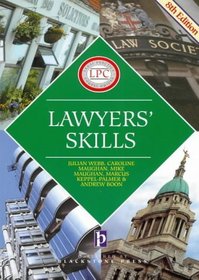Search -
Lawyers' Skills 2001-2002 (Legal Practice Course Guides)
Lawyers' Skills 2001-2002 - Legal Practice Course Guides
Author:
The new editions of "Legal Practice Course Guides" mark a shift in focus, from the traditional book-learning of the old course towards an emphasis on legal skills gained through practical exercises. Each guide explains the relevant substantive and procedural law and, where appropriate, contains sample precedents, documents and check lists, as we... more »
Author:
The new editions of "Legal Practice Course Guides" mark a shift in focus, from the traditional book-learning of the old course towards an emphasis on legal skills gained through practical exercises. Each guide explains the relevant substantive and procedural law and, where appropriate, contains sample precedents, documents and check lists, as we... more »
ISBN-13: 9781841742342
ISBN-10: 1841742341
Publication Date: 8/13/2001
Pages: 240
Edition: Revised
Rating: ?
ISBN-10: 1841742341
Publication Date: 8/13/2001
Pages: 240
Edition: Revised
Rating: ?
0 stars, based on 0 rating




